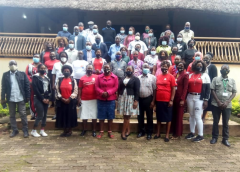
The intervention consisted in replicating the training activities that UNCTAD Trade, Gender and Development Programme developed under the Development Account project “Informal cross-border trade for the empowerment of women, economic development, and regional integration in Southern and Eastern Africa”. Under the previous intervention, implemented during 2016-2019, UNCTAD:
- published the study BORDERLINE: Women in informal cross-border trade in Malawi, the United Republic of Tanzania and Zambia, and the policy advocacy document Gender-sensitive policy recommendations to support women cross-border traders in Malawi, the United Republic of Tanzania and Zambia;
- developed a training programme on cross-border trade rules and procedures, and entrepreneurship skill building targeting women informal and small-scale traders. The training programme built on UNCTAD’s Traders’ Guides for informal and small-scale traders and on the Empretec Programme.
In 2020, Phase II of the Global Initiative towards post-Covid-19 resurgence of the MSME sector provided additional funding to scale up the training programme and replicate the workshops in Malawi, Tanzania and Zambia.
The trainings workshops were delivered at the following borders:
Nakonde, Zambia, on 1-6 February 2021
Kyela, Tanzania, on 1-6 February 2021
Karonga, Malawi, on 8-13 February 2021
Chipata, Zambia, on 8-13 and 15 February 2021
The workshops lasted 6 days and aimed to tackle the following priority areas:
i) lack of knowledge about customs rules and procedures and difficulty of sourcing reliable and up-to-date information by women informal traders;
ii) Lack of entrepreneurial skills, making it difficult for women traders to seize any opportunity for scale-up or diversification; and
iii) new border measures due to COVID-19.
During Phase II, UNCTAD trained 131 traders, over 90% of which were women. The training was succesful in providing traders with the knowledge needed to cross the borders by complying with existing regulations; in rasing awareness about schemes that are in place to facilitate small-scale cross border trade; and in equipping traders with the skills to identify business opportunities, establish or improve their business. The workshops also put an emphasis on the impacts of COVID-19 on traders' businesses and on the importance of continuous dialogue between informal traders and border officials since this is one of factors that hinders informal traders from considering formal trade as a feasible option.
Over 90% of training participants rated the workshops as excellent or good, and indicated that the training improved "Extremely", "very much" or "adequately" their understanding of traders' rights and obligations, Simplified Trade Regimes and Changes due to COVID.
On 17 March 2021, UNCTAD, jointly with the Economic Commission for Africa, hosted the event “What future for women small-scale and informal cross-border traders in Africa?”, which built on the outcomes and findings of Phase II. The event was organized in the framework of the 65th Commission on the Status of Women (CSW65). It provided an opportunity to discuss the impacts that the COVID-19 pandemic and the newly introduced restrictive measures affecting the movement of people and merchandise have had on women informal and small-scale traders across African borders. The recording of the Zoom event is available here.
A news piece on the trainings is available here.
